Week ending 5 September 2020
REGIONAL OVERVIEW
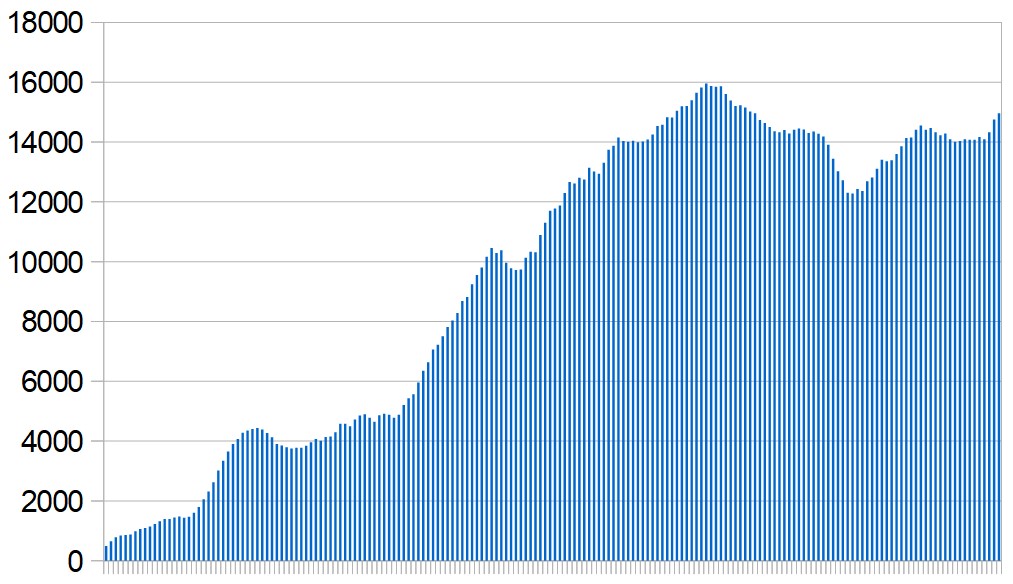 |
New Covid-19 infections in the Middle East and North Africa remain fairly constant according to official figures, ranging between 14,000 and 15,000 cases a day during the last three weeks. Among the 20 countries monitored, only seven recorded a decrease this week.
Iraq continues to report the highest number of new infections in the region and the situation in Israel has worsened, with new cases now running at more than 2,000 a day.
The main problem, almost everywhere in the region, is non-compliance with preventive measures and this has wider implications for the relationship between regimes and the people they govern.
Detailed statistics for the region, based on official figures, can be found in this spreadsheet.
Previous situation reports:
August 29; August 22; August 15; August 8; August 1; July 25; July 18; July 11; July 4; June 27; June 20.
ALGERIA
Algeria's outbreak peaked towards the end of July when more than 600 new infections were being recorded each day. Since then the trend has been downwards, with new cases averaging 333 a day during the past week according to official figures.
For more information see: Covid-19 in Algeria
Confirmed cases: 45,733
New cases in past week: 2,330
Active cases: 11,975
Deaths: 1,539
Tests carried out: (unknown)
BAHRAIN
Bahrain has almost 30,000 known cases per million inhabitants. This makes it the world's third most infected country after Qatar and French Guiana. However, Bahrain is also one of the world leaders in Covid-19 testing. So far, about two-thirds of its 1.7 million population have been tested.
The daily total of new cases fluctuates but Bahrain's epidemic appears to be subsiding gradually. The number of people reported to be currently infected is 3,577 compared with 5,700 at the peak in mid-June.
Bahraini citizens accounted for 53% of cases recorded between July 9 and August 26 – the remainder were expatriates.
After a closure lasting more than five months, cafes and restaurants were allowed to reopen on Thursday, but only for customers seated outdoors.
Six thousand people in Bahrain are reported to be taking part in trials of a vaccine on behalf of the Chinese company Sinopharm.
For more information see: Covid-19 in Bahrain
Confirmed cases: 54,095
New cases in past week: 3,577
Active cases: 3,164
Deaths: 195
Tests carried out: 1.2 million
EGYPT
New cases peaked in June and have fallen sharply during the past few weeks, according to official figures. This week's average was 185 cases a day compared with almost 1,600 at the peak.
The new school year is due to start later than usual, on October 17. Arab News has a report on some of the planned safety precautions. School and university classes were suspended last March. Since then, according to al-Ahram, most of Egypt's 23 million students have remained at home, with assignments given online. Those taking their final high school exams did so in person in June and July.
An employee at the health ministry's central laboratories was arrested for selling negative Covid-19 test certificates. The price of the forged certificates is said to have been LE1,000 ($63).
For more information see: Covid-19 in Egypt
Confirmed cases: 99,582
New cases in past week: 1,297
Active cases: 17,782
Deaths: 5,495
Tests carried out: 135,000
IRAN
Iran was the first country in the region to be seriously affected by the virus. Government figures show an initial wave of infections which peaked at the end of March. It subsided during April, briefly dipping below 1,000 new cases per day but then rose to another peak in the first week of June.
However, the situation now seems to be improving and new cases this week fell below 2,000 a day for the first time since May. Health ministry spokeswoman Sima Sadat Lari said this week that 28 of Iran's 31 provinces are still "in red condition or the status of alert".
Iran continues to report more coronavirus-related deaths than any other country in the region.
Confirmed cases: 382,772
New cases in past week: 12,861
Active cases: 30,420
Deaths: 22,044
Tests carried out: 3.3 million
IRAQ
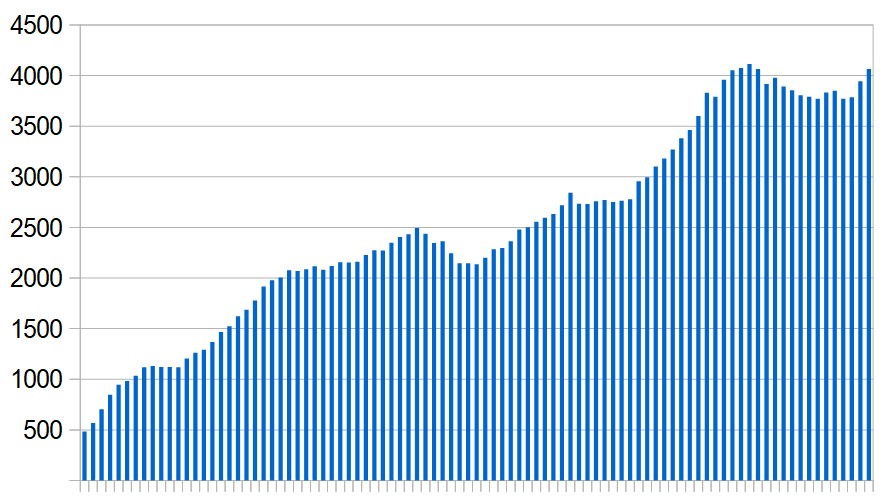 |
Iraq is currently recording more new infections than any other country in the region. New cases this week averaged more than 4,000 a day with a record 5,036 reported on Friday.
Iraq's official figures are widely believed to understate the scale of the epidemic. Many cases go unreported because of social stigma. Compliance with preventive measures appears to be low and health services are inadequate.
In a report this week the UNHCR described the situation in Iraq as concerning. "While the government of Iraq has extended the current curfew measures across central and southern governorates until further notice, the latest reports indicate that only a small percentage of the population is actually respecting them," it said. "Despite warnings by the government to avoid mass gatherings, thousands of pilgrims started gathering in the city of Kerbala to mark the holy month of Muharram ... "
According to the UNHCR, more than 30% of the total cases have been detected in Baghdad, followed by Basrah, Kerbala and Sulaymaniyah.
For more information see: Covid-19 in Iraq
Confirmed cases: 252,075
New cases in past week: 28,463
Active cases: 53,348
Deaths: 7,359
Tests carried out: 1.7 million
ISRAEL
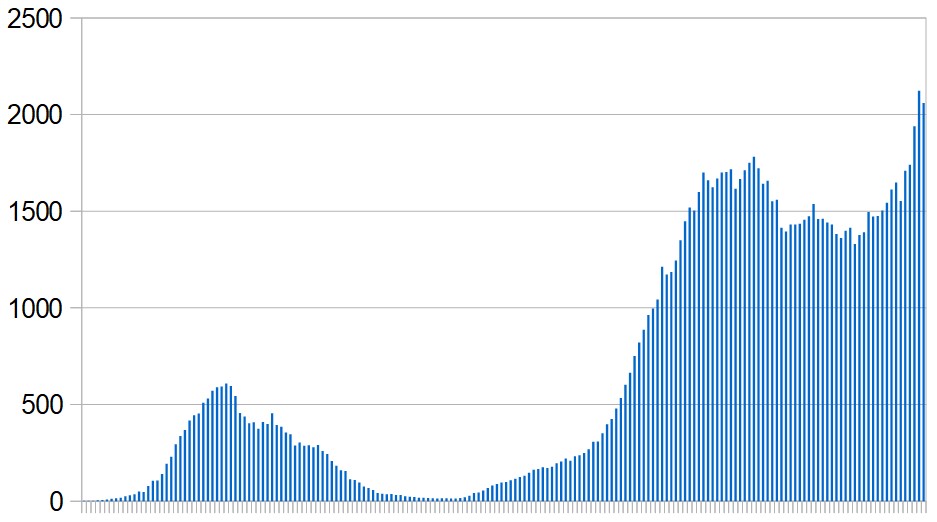 |
After coming close to bringing the epidemic under control, Israel has been hit by a second wave much larger than the first. The first wave peaked at around 600 new cases a day in early April. Efforts to control it were intially successful and by the second half of May new cases had dropped to about 15 a day.
However, the virus surged back when lockdown restrictions were lifted and new cases this week have averaged more than 2,000 a day.
For more information see: Covid-19 in Israel
Confirmed cases: 126,419
New cases in past week: 14,419
Active cases: 25,069
Deaths: 9934
Tests carried out: 2.4 million
JORDAN
Until recently Jordan appeared to be the most successful Arab country in controlling the virus. Although it continued to intercept new cases among people arriving from abroad, transmission within the country had virtually ceased. Since then, however, there has been a spate of locally-occurring cases and they now account for almost all the newly-detected infections.
Jordan's outbreak is still small, with only a couple of thousand cases confirmed so far, and daily totals of new infections have not so far risen above double figures. This week's average was 62 cases a day.
Schools reopened on Tuesday after a five-month closure, though teaching had to be suspended in some areas because of infections.
For more information see: Covid-19 in Jordan
Confirmed cases: 2,301
New cases in past week: 432
Active cases: 609
Deaths: 16
Tests carried out: 873,000
KUWAIT
New infections peaked in late May at just over 1,000 cases a day. The numbers have dropped back substantially since then and this week's average was 666 a day.
For more information see: Covid-19 in Kuwait
Confirmed cases: 88,243
New cases in past week: 4,665
Active cases: 8,289
Deaths: 537
Tests carried out: 636,000
LEBANON
Political and economic turmoil, plus the devastating explosion in Beirut on August 4, have diverted attention from the coronavirus. Lebanon's outbreak is still relatively small and although new infections have more than trebled during the past month they appear to have stopped rising. New cases this week averaged 554 a day – slightly below last week's level.
For more information see: Covid-19 in Lebanon
Confirmed cases: 19,490
New cases in past week: 3,877
Active cases: 13,715
Deaths: 183
Tests carried out: 563,000
LIBYA
Libya is in its ninth year of internal conflict. The UN-backed Government of National Unity in Tripoli is challenged by Field Marshall Haftar's forces based in the east of the country. There are also numerous militias. This leaves the country ill-equipped to cope with a major epidemic.
Growing levels of insecurity, political fragmentation and weak governance have led to a deterioration of basic services, particularly in the health system. At least 27 health facilities have been damaged or closed by fighting and some have been attacked directly. There are 870,000 people – refugees, asylum seekers and displaced persons – who the UN regards as especially vulnerable.
New infections have risen significantly this week, averaging 545 a day compared with 358 the week before, according to official figures.
For more information see: Covid-19 in Libya
Confirmed cases: 16,445
New cases in past week: 3,816
Active cases: 14,273
Deaths: 262
Tests carried out: 128,000
MOROCCO
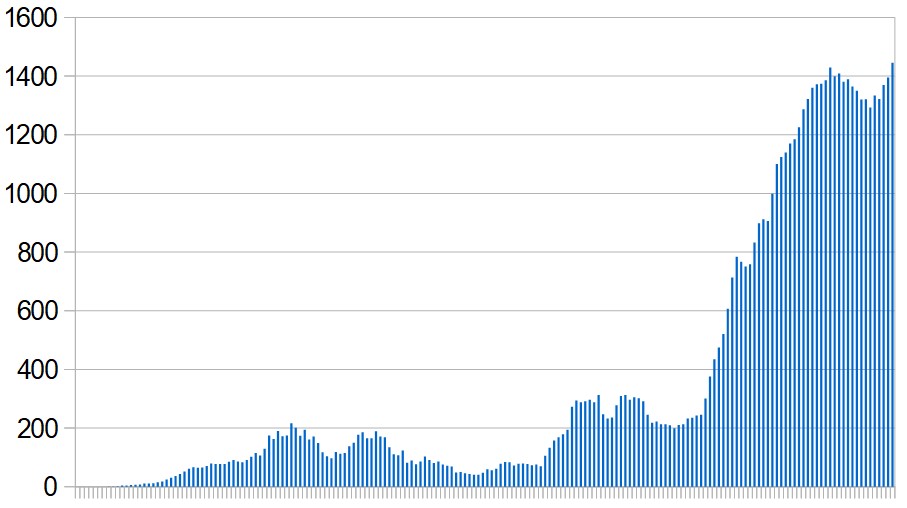 |
By early June a strict lockdown had reduced new cases in Morocco to around 40 a day. Since then, though, there has been a major setback and new cases this week have been averaging 1,445 a day.
For more information see: Covid-19 in Morocco
Confirmed cases: 68,605
New cases in past week: 10,116
Active cases: 14,388
Deaths: 1,292
Tests carried out: 2 million
OMAN
Infections peaked in mid-July with just under 1,600 cases a day but have dropped back considerably since then. The numbers have been relatively stable over the last three weeks, averaging just below 200 a day.
For more information see: Covid-19 in Oman
Confirmed cases: 86,380
New cases in past week: 1,375
Active cases: 14,830
Deaths: 705
Tests carried out: 309,000
PALESTINE
Before last week the Palestinian enclave of Gaza had been relatively virus-free, with only 117 cases recorded since the start of the pandemic. Last week, however, 75 new cases were reported and the Hamas authorities imposed a lockdown. A further 505 cases have been reported this week. Gaza is densely populated, with limited medical facilities, and a major outbreak could be disastrous.
The Mondoweiss website has an article by Aya al-Ghazzawi on daily life in Gaza during the pandemic and another from a doctor describing the medical situation.
Meanwhile, the upward trend in the West Bank continues, with 3,242 new cases reported this week. Hebron is the most seriously affected area, accounting for more than 40% of the cases confirmed so far. On Friday President Mahmoud Abbas another one-month extension of the state of emergency – for the seventh time since March.
Many of the West Bank infections are attributed to people ignoring the rules for social distancing, which the authorities have difficulty enforcing. The health ministry says more than 30% of cases are the result of Palestinians travelling to and from work in Israel which is in the second wave of its epidemic.
For more information see: Covid-19 in Palestine
Confirmed cases: 32,976 (West Bank 22,165, Gaza 697, East Jerusalem 10,114)
New cases in past week: 4,866
Active cases: 8,967
Deaths: 192
Tests carried out: 297,000
QATAR
In population terms Qatar has more known cases than any other country – 42,500 per million inhabitants. Migrant workers have been disproportionately affected. Qatar's epidemic reached a peak in the first week of June but infections have fallen since then. New cases this week averaged 206 a day – well below the peak of more than 1,800 a day.
For more information see: Covid-19 in Qatar
Confirmed cases: 119,637
New cases in past week: 1,441
Active cases: 2,898
Deaths: 201
Tests carried out: 650,000
SAUDI ARABIA
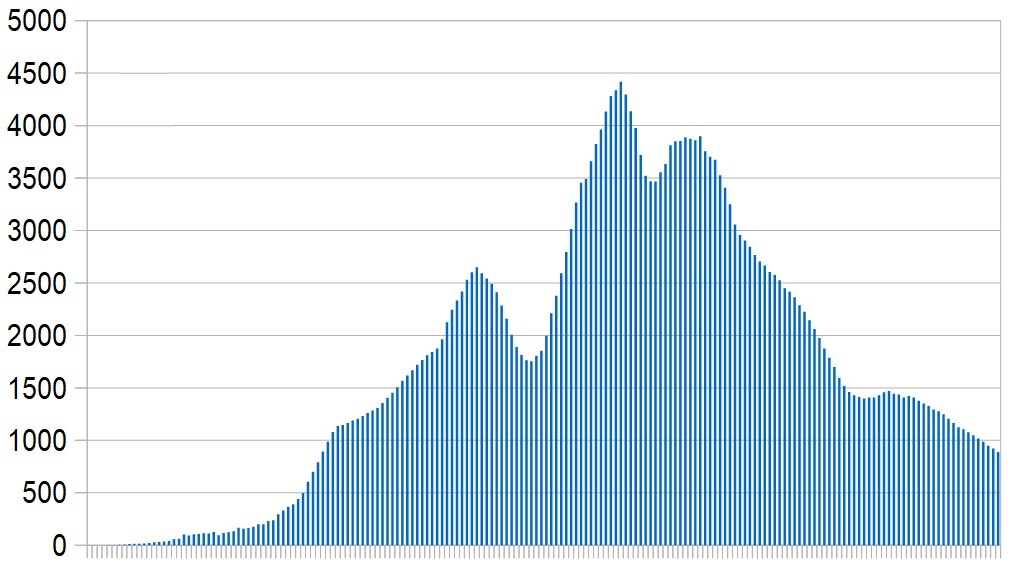 |
Saudi Arabia has the largest number of recorded cases among the Arab countries. New infections reached an initial peak in the fourth week of May, then dropped back slightly before rising to a higher peak in the third week of June. Since then, though, there has been a substantial improvement.
New cases this week averaged 888 a day – the lowest level since April.
For more information see: Covid-19 in Saudi Arabia
Confirmed cases: 319,141
New cases in past week: 6,217
Active cases: 20,063
Deaths: 4,015
Tests carried out: 5.3 million
SUDAN
The coronavirus struck Sudan in the midst of a political transition following a popular uprising against the regime of President Bashir and the country is ill-equipped to cope with a major epidemic. Testing is very limited and official figures don't reflect the full scale of the outbreak. The health ministry appears to have stopped issuing daily reports – the last update was on August 27.
For more information see: Covid-19 in Sudan
Confirmed cases: 13,189
New cases in past week: 107
Active cases: 5,754
Deaths: 823
Tests carried out: (unknown)
SYRIA
According to official figures only 3,041 cases have been recorded in areas controlled by the Assad regime – though more than two-thirds of those have occurred this month.
The authorities' lack of transparency fuels suspicions that many cases are being concealed. There is also some evidence that people with Covid-19 symptoms are reluctant to contact the authorities. While there are plenty of signs that the true figures are higher than those issued by the regime, it is unclear how high they really are.
The UN's Office for the Coordination of Humanitarian Affairs commented on disputes about the figures for the first time in a report issued on Wednesday. It said:
"In particular throughout July and August, humanitarian actors have received ongoing and increased numbers of unverified reports concerning additional possible cases, and information indicating that in some areas, existing healthcare facilities have been unable to absorb all suspected cases and/or healthcare facilities are suspending surgeries or adapting wards to accommodate increased numbers of Covid-19 patients.
"Unverified reports received include a rise in obituaries, death notices and burials. Increased reporting across a range of media outlets on Covid-19 has also continued in Syria, notably on Facebook, where health care professionals, posting in a personal capacity, have indicated that the actual Covid-19 caseload in Damascus alone is far higher than official records.
"While the UN is not in a position to verify this information or directly link it to cases of Covid-19; it is clear that during the past two months the epidemiological situation across Syria has rapidly evolved. In July, 532 cases were confirmed, compared to 157 cases in June and 79 cases in May. At the time of writing, authorities have confirmed 2,008 cases in August and 65 in September.
"Given the limited testing across Syria, it is therefore likely that in particular asymptomatic and mild cases are going undetected and the actual number of cases may far exceed official figures. Of note, among official cases confirmed by the MoH [Ministry of Health] the source of approximately 89% of cases to date remains unknown. These factors indicate that community transmission across Syria is now widespread.
"As official numbers have increased, contact tracing has also emerged as a particular challenge, including in more remote governorates and camps. In addition, for reasons including community stigma and individual reluctance to go to hospitals, it is likely significant numbers of people with symptoms are not seeking treatment or obtaining private services offering home care. In addition to making actual numbers of cases difficult to ascertain, this may increase the risk of late referral of severe/complicated cases for treatment, negatively impacting the long-term health prospects and survival of patients."
Fears have been raised about north-western and north-eastern parts of the country which are outside the regime's control. Millions of displaced people are living in those areas and health services are often rudimentary. So far, 557 cases have been confirmed in the north-east (460 in al-Hasakeh, 62 in Aleppo, 32 in Raqqa, and 21 in Deir-ez-Zor). The north-west appears to be less affected, with only 93 known cases so far.
For more information see: Covid-19 in Syria
The following figures relate to regime-controlled areas only:
Confirmed cases: 3,041
New cases in past week: 478
Active cases: 2,216
Deaths: 127
Tests carried out: 26,572 (by 24 August)
TUNISIA
In June, Tunisia appeared to be almost free of the virus and began promoting itself as a safe holiday destination. Since then, though, there has been a setback.
Tunisia's outbreak remains small but the number of new cases continues to rise, averaging 148 a day this week.
For more information see: Covid-19 in Tunisia
Confirmed cases: 4,542
New cases in past week: 854
Active cases: 2,756
Deaths: 87
Tests carried out: 153,000
UNITED ARAB EMIRATES
The UAE's epidemic peaked in the last week of May when new infections were running at more than 900 a day. Numbers of new cases are now considerably lower, though this week's average of 552 a day is the highest since early July.
The UAE has carried out more tests per head of population than any other Arab country and ranks tenth worldwide in terms of tests carried out.
For more information see: Covid-19 in the UAE
Confirmed cases: 72,766
New cases in past week: 3,865
Active cases: 9,221
Deaths: 387
Tests carried out: 7.4 million
YEMEN
Because of the ongoing war, Yemen already faced a humanitarian crisis before the coronavirus arrived. Millions are malnourished and vulnerable to disease, and health services are inadequate. Official figures grossly understate the severity of the epidemic. Cholera is also prevalent.
The UN's Office for the Coordination of Humanitarian Affairs reported this week that the $3.38 billion international Humanitarian Response Plan for Yemen is only 24% funded and support inside the country is having to be drastically reduced. One effect if this is that nine million people are about to be cut off from medical care and treatment for over a quarter of a million severely malnourished children will stop.
For more information see: Covid-19 in Yemen
Confirmed cases: 1,987
New cases in past week: 40
Active cases: 217
Deaths: 573
Tests carried out: (unknown)

 RSS Feed
RSS Feed
